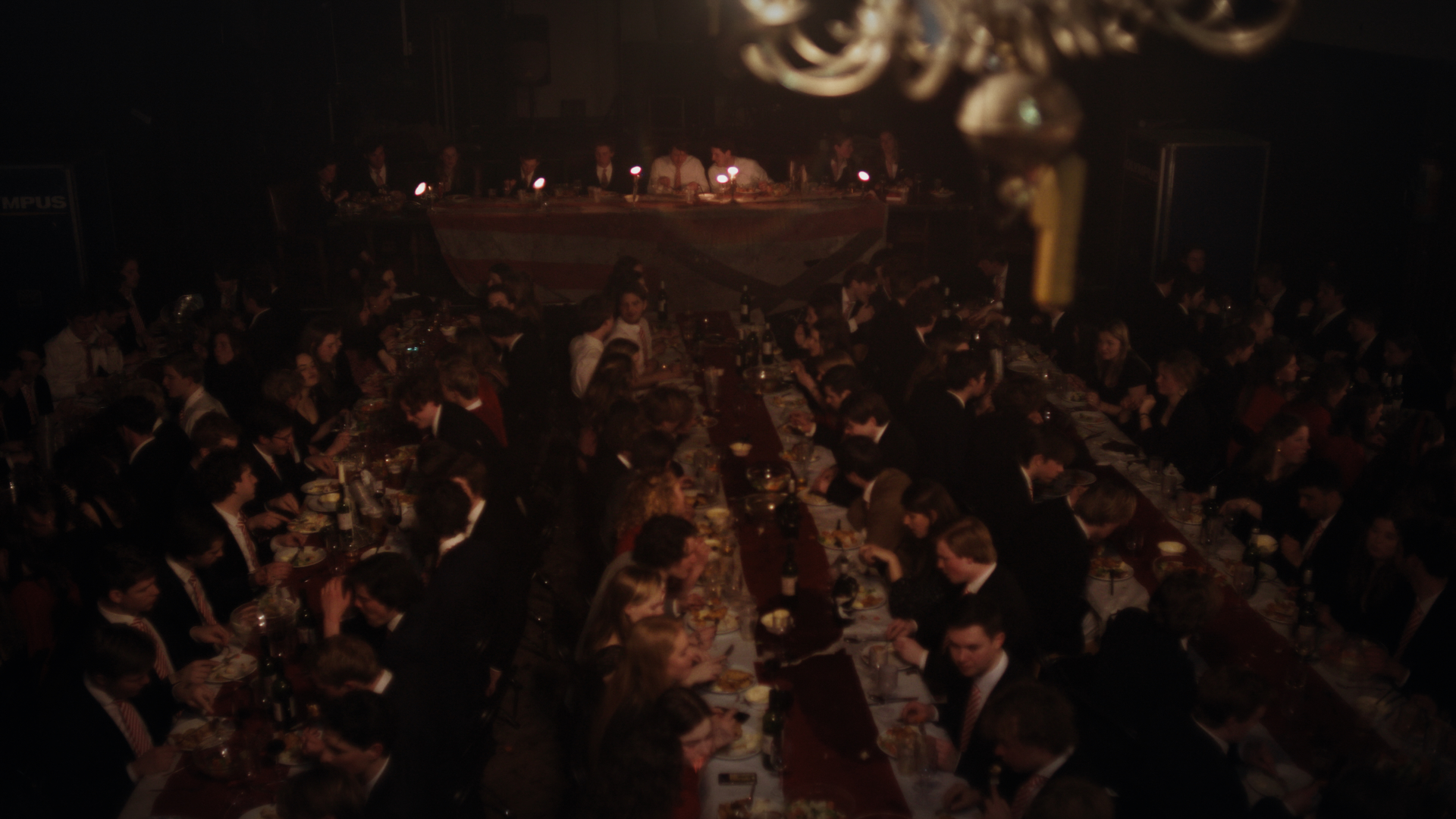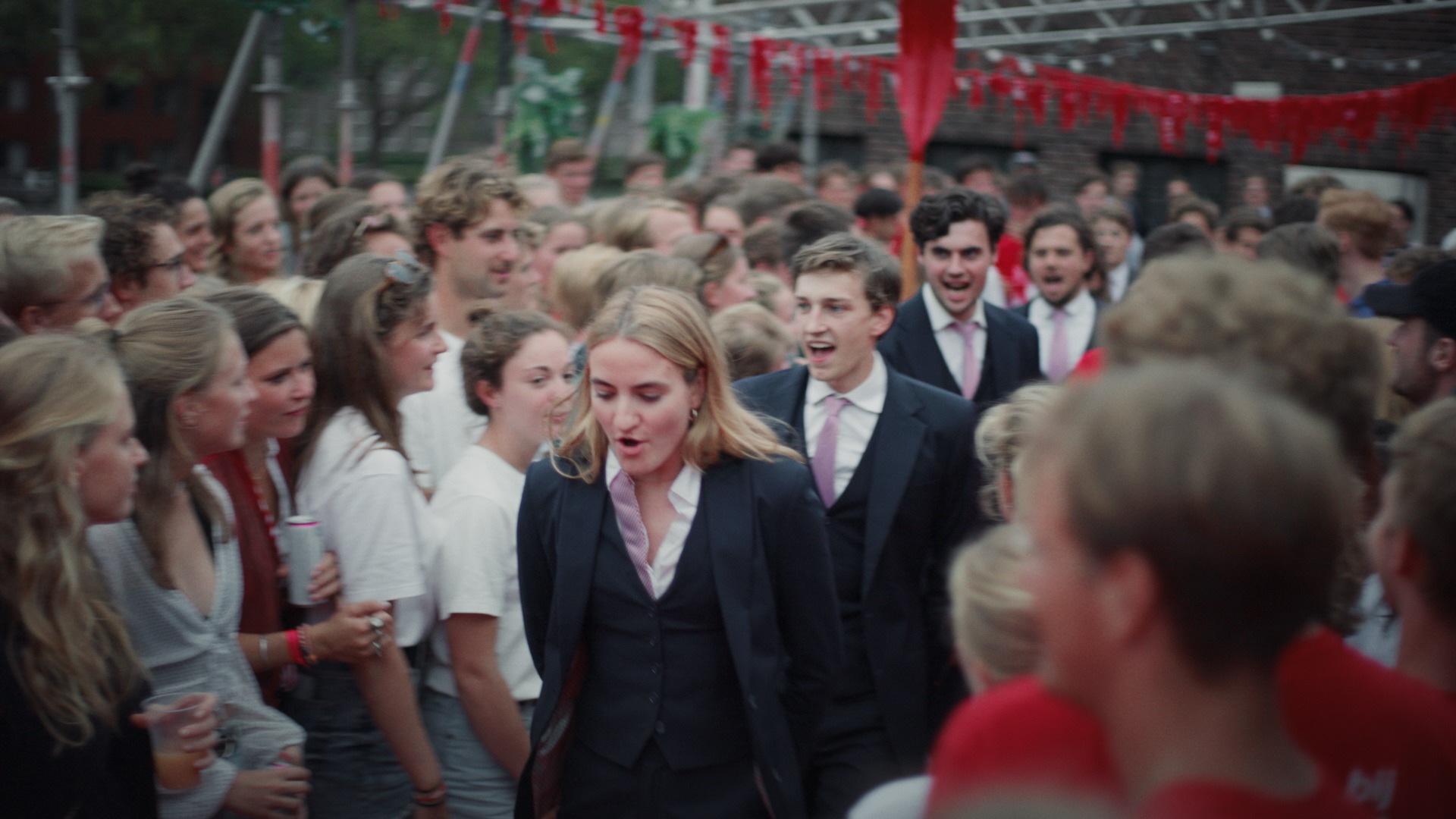The documentary ‘Water & Beer’ follows the 147th year in the history of Laga, a TU Delft student rowing club, from the inside. Filmmaker Lisa Boerstra filmed elite sports in a rowing club fraternity to understand what students are searching for there.
Still from the documentary ‘Water & Beer’ on DSRV Laga by Lisa Boerstra.
It’s early April. On the choppy waters of the Amsterdam-Rhine Canal near Jutphaas, seven rowing boats are competing for first place. On the bank, hundreds of students in club jackets stand cheering, kicking up clumps of grass as they stomp their heels and toss bits at each other, a beer in the other hand. It then becomes a mix of rowing and roughhousing: students grab each other by the lapels, trying to wrestle each other to the ground, all in good fun. Watch out for the club emblems though – these trophies are prized. After the finish, the supporters of the winning team quickly strip off and, barely clothed but still wearing ties, plunge into the cold water. ‘Properly dressed,’ they swim en masse to the boat to congratulate their champions.
Documentary filmmaker Lisa Boerstra had often looked on in fascination. She had previously made Dushi (2004), a documentary about women in Curaçao, and Life @ Lowlands, about three teenage girls at a music festival. “I’ve long been interested in student societies,” Boerstra admits. “The people you meet there often become defining figures in your life. I met the father of my children at one. The Varsity has both the rituals of traditional student societies and top-tier sports, all in one place.”
But the Varsity is an arena, not a film, she says. So she went in search of a rowing club fraternity to capture student life from the inside. She first approached Triton, the Utrecht student rowing association, which has hosted the Varsity since 1939. “Fraternities often make the news for the wrong reasons, with ‘hookup lists’ and ‘semen buckets’,” notes Boerstra. “And yet, every year, first-year students queue up to join. That’s fascinating. I told the board to open up, participate, show what you do.” While former members supported the idea, the new board members were hesitant and eventually backed out. “Young people, I guess. Just a bit of cold feet.”

Setting up
It was through coach Francesco Fossi that Boerstra found her way to Laga, the TU Delft student rowing club, in 2019. The club has grown significantly since 2002, when the requirement to also join the Delftsch Studenten Corps was dropped. The charming red-and-white painted clubhouse on Nieuwelaan was originally built for 300 members but now accommodates 800. The Laga Board was receptive to Boerstra’s appeal for greater openness and agreed to the film. Then the pandemic struck.
For Boerstra, this meant a three-year delay, as everything was still far from normal in the first post-lockdown (2021-2022) year. However, the Board agreed to the plan to host a film crew the following year. The responsibility of assisting the crew fell on the new president, Julia van Mens.
“I thought it was fantastic to help make a documentary. Who else gets to say they’ve done that?” she recalls. For her, the personal development of students at Laga is central. “Here you can develop alongside others. We know how that process works, so come on in and see how students grow at Laga.”
How did this openness work in practice? Julia van Mens explains. “Lisa did her best to see what would be interesting to film. She spoke to over 100 people to get a picture of the club. We were free to say ‘no’ if we needed to, that was the agreement. Of course, there were members who didn’t share my openness and didn’t want to appear on camera, and that was fine too. The filming was an intensive process with weekly meetings. It was sometimes challenging, but always honest and fair.”
For Boerstra, working with engineering students who kept to their word was a treat. “I didn’t want to make a film just about rowing, and they knew that. I wanted to capture the rituals too, which they sometimes found challenging. But I wasn’t there to film drunk students all the time, and we were usually out after an hour. It’s really not a big deal to show students having a drink. Imagine if no one drank in the film, that would be strange.”

Almost brought to tears
She started filming the selection weekend at the Willem Alexander Baan. Coach Jelle addresses the first-year students, telling them that everything depends on dedication, motivation, and perseverance. “It’s really all about motivation – wanting to outdo the guy next to you. If you really want that, commitment and perseverance follow naturally.”
We see what this means as students get on the rowing machines. Whoosh, whoosh, whoosh sounds fill the space. “Hang in there! Don’t slack off!” Big eyes, open mouths, red faces. “Your whole body’s telling you to stop,” yells Coach Jelle. “But we NEVER stop!” After the training, two girls lie on the floor next to their rowing machines, hair slick with sweat, red blotches on their necks. “I was about to cry,” says one. “Me too,” replies the other.
In terms of rituals, Boerstra was delighted with the competition dinner held in the Delftsch Studenten Corps building. “It was straight out of Harry Potter with all that candlelight. It was special to be allowed in there – a real treat.”

Favourite scenes
“Politesse!” shouts the president as she smoothly steps onto one of the long tables. In the dim light, the diners quickly draw their plates and glasses closer. The president paces back and forth down the centre. “Smoelen! It means shut up when someone’s standing on the table.” Then it’s time for the Laga prayer. Everyone slips off their chairs, kneeling with heads bowed. Silence falls. The prayer leader says an invocation, and the entire gathering murmurs, “For the fastest is always Laga.” After the “Amen!” the dinner resumes.
Boerstra’s favourite scene, however, is another one. Last year, Laga sent four rowers to the Olympics. Boerstra was there when one of the candidates, Willemijn Mulder, received a call from the Dutch rowing federation while at a Laga training camp in Spain. “She gets a call from the head coach, who tells her she’s been accepted. It means she has to move to Amsterdam. She starts sobbing because she doesn’t want to leave Laga and her fun house with her friends. It’s touching because you suddenly understand what Laga means to her.”
Julia van Mens’ favourite scene is the Varsity. The film follows the ‘old four’, who must uphold the club’s honour against other student rowing societies. You see the concentration, the nerves, the choppy water, and the coxswain shouting. After a poor start, the men row their hearts out, but they only manage to overtake Skadi, the Rotterdam student rowing club. After 3,200 metres, Laga finishes 40 seconds behind the winner, Triton. Van Mens reflects on the scene. “The old four then stops, and a long silence follows. They look around and see Triton celebrating. They row to the bank silently. The scene touches me because it shows all the energy they’ve invested, and it’s okay to be disappointed. Other opportunities will come.”

This is how I know Laga
How does Van Mens feel about the film that was shot during her year as president and that she learned at the last minute that she would play a prominent role in it? “After the screening, I felt relieved and impressed with how beautifully the club is portrayed. And there’s recognition too – this is my familiar Laga.”
Filmmaker Boerstra has gained more understanding of the allure of traditional student clubs. “All those rituals and the constant singing – I didn’t quite understand it as an outsider. But when you’re on the inside and are part of everything, you’re part of the group experience. It really bonds them. And how does that work? You can see that in the film.”
- The documentary Water & Beer (85 minutes) by Lisa Boerstra airs on Thursday, 7 November 2024, at 22:20 on BNNVARA on NPO2.

Do you have a question or comment about this article?
j.w.wassink@tudelft.nl


Comments are closed.